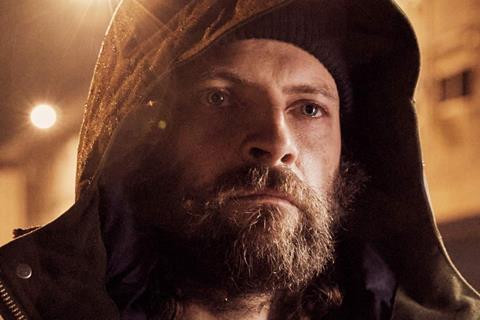
Italian actor Alessandro Borghi has become a familiar face at the Venice Film Festival in recent years and returns to the Lido as the star of Francesco Carrozzini’s The Hanging Sun, which is set to close the 79th edition on Saturday (September 10).
Based on a novel by renowned Norwegian crime writer Jo Nesbo, Borghi plays a man on the run from his mob boss father. Jessica Brown Findlay, Peter Mullan and Charles Dance also star in the drama, produced by the UK’s Sky with Italy’s Cattleya and Groenlandia.
It caps a stellar year for Borghi, during which he has starred in Italian drama The Eight Mountains, which won the jury prize when it played in Competition at Cannes, and Michele Vannucci’s Delta, which premiered at Locarno. He has also teamed with writer-businessman Guido Maria Brera to launch Newness, a company that will help young writers develop stories for the screen.
Borghi, who is known for roles in TV series Devils and Suburra: Blood On Rome, is no stranger to Venice. He starred in Claudio Caligari’s Don’t Be Bad, which played out of competition at Venice in 2015; Michele Vannucci’s I Was A Dreamer, which competed in Horizons in 2016; Netflix shocker On My Skin, which also played Horizons in 2018; and post-apocalyptic Dogworld, selected for Critics’ Week in 2021. In addition, he hosted the opening and closing ceremonies for the festival in 2017.
The Italian star spoke to Screen about why The Hanging Sun is his most “enjoyable ride” to date, why he momentarily got “pissed” at Venice and his ambitions for Newness.
The Hanging Sun is co-produced by Groenlandia with TV production companies Cattleya and Sky. Are the best Italian projects right now coming from TV outfits?
The Hanging Sun was made only thanks to the tenacity of people who want to make cinema. Three times the film was about to start and three times we had to abort. Films are supposed to stay in theatres for 90 days and then go to TV, but if we don’t exploit that window the audience will just wait for it to arrive on TV. It was therefore decided to put the film into theatres for three days before showing on TV. We are told that TV is a safe spot for films but only a good cinema run can create real enthusiasm in the audience.
Is adapting a thriller a way to create that enthusiasm?
The Hanging Sun really is a mainstream movie. It’s probably the easiest film to watch that I have ever made – an enjoyable ride for everybody. I think the Italian industry needs more of this and less of wannabe auteurs.
Do festivals remain important to generate awareness for such films?
Distribution wise, yes. Many films aren’t even distributed if they don’t get a festival slot. On the other hand, the competition for selection is brutal and I get mad when rejected. Delta was rejected by Venice last year and I was pissed, but I eventually understood that they were right. The official competition was brutal that year and we would have been crushed. The film also needed some intervention and the version that was screened at Locarno, nearly a year later, was completely different – a marvellous film.
What is your ambition with your Newness initiative?
It all started when me and Guido Brera noticed that the scripts we were receiving all looked the same. We can’t change everything by ourselves but a factory in which young writers have new possibilities is something we can do. We have hired eight screenwriters that will finish the first three stories soon. Those will be brought to the top players to which Guido and me have access. They are stories with a free approach to storytelling, which have not been written with market parameters in mind.
What can you say about these three projects?
One is mainstream, another is meant for festivals and the third is a crossover between the two. This is how we see them at the moment. The final result will depend on what the producers think.
Will Newness also produce?
Not at the moment. Maybe we can co-produce but it is not our focus right now. We aim to sustain ourselves and reinvest to grow. My dream is to have 20 people writing for different countries in five years from now.






![The Brightest SunScreen[Courtesy HKIFF]](https://d1nslcd7m2225b.cloudfront.net/Pictures/274x183/3/5/0/1448350_thebrightestsunscreencourtesyhkiff_312678.jpg)


















No comments yet